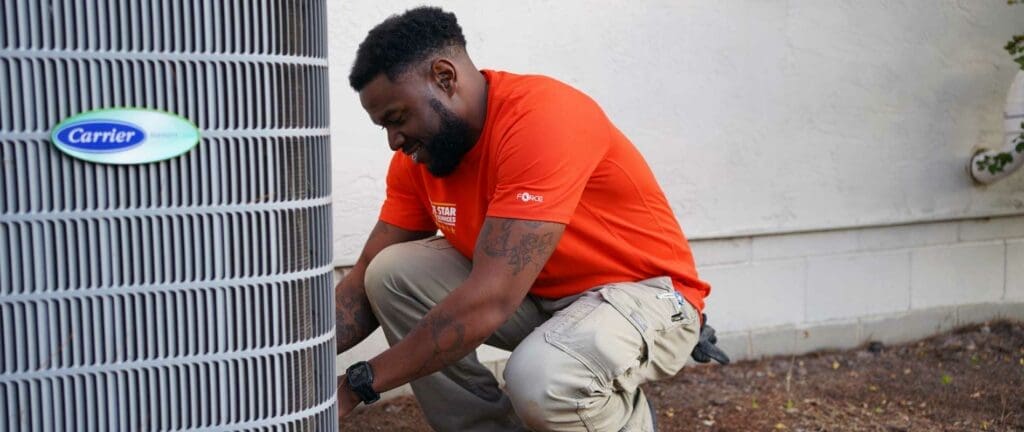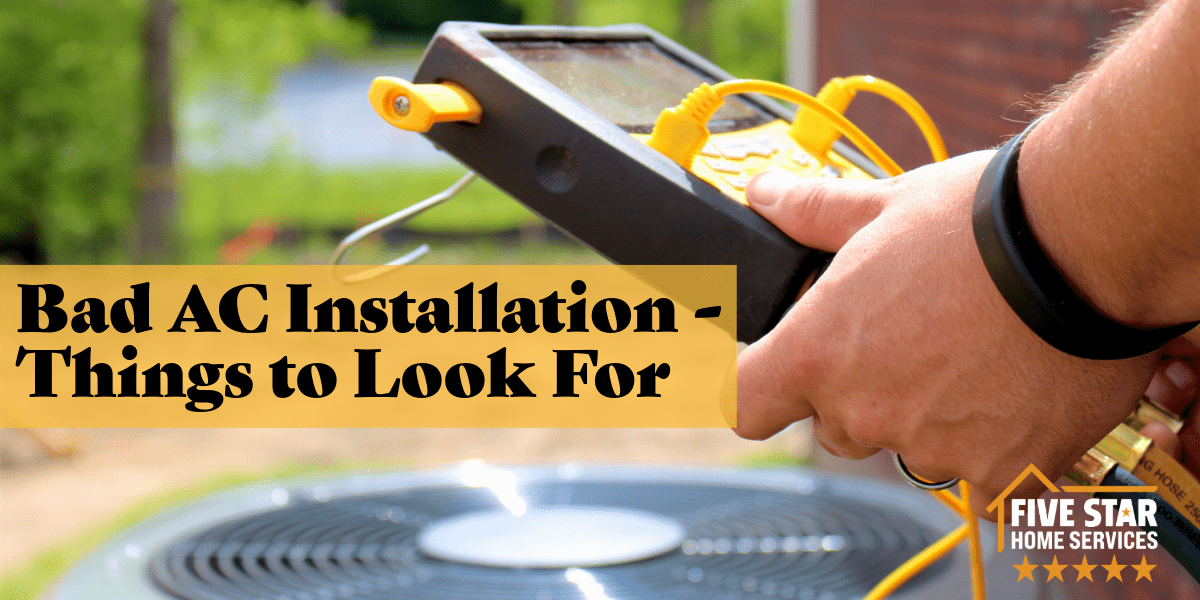Home comfort systems are complex and intricate machines requiring professional care and attention. No one knows this better than your friends here at Five Star Home Services.
In the following, we will discuss Bad Air Conditioner Installation – and the Signs to Look For:
Believe it or not, in today’s world, approximately 90% of air conditioning installations are performed incorrectly to some extent. If you think this percentage sounds too high, you should think again.
The North Carolina Alternative Energy Corporation, a non-profit group, says otherwise. This group looked at A/C efficiencies that should occur with installations that are to manufacturer code, then compared those numbers to what they found after real-world installation.
Their findings were that 90% of the air conditioners had some sort of problem that caused them to waste energy relative to their peak performance.
Throughout the years, other assessments have corroborated these numbers, which the industry keeps an eye on. Although it isn’t always 90%, it is still a problem. Keep in mind this isn’t an equipment problem. This is an installation problem.
Over the last half of a century, many things have helped Five Star Home Services grow into a household name and brand customers’ trust.
One of the biggest reasons, nonetheless, is that we do the little things in installation and service that other companies don’t. We stand behind every job and make this a point of pride for us. While there aren’t any perfect HVAC contractors, our processes are as thorough as anyone’s. More importantly, we want to do what’s right for the customer.
To sum it all up, we aim to remain at 10% at all times.
So how do we do this? For starters, we aim to talk you through a few areas below where we generally see problems most frequently. This will help you assess your HVAC installation; it will also help you ask the right questions for your next HVAC project. Knowledge is power, after all!
Pulling Permits in HVAC
Permit inspections are one of the last steps of an air conditioner installation. Nevertheless, we are including it here for a reason. We do this because waiting is a bad idea. If you wait until your installation is done to see if your contractor is pulling out a permit, it is already too late.
What is “pulling a permit?” This term refers to the process of obtaining all the necessary local permits for HVAC work. As part of this formal process, inspectors come out and look at the completed installation. Most of the municipalities in Ohio require a permit to do work. So why are we including them here? We include it and mention it because, sadly, not all HVAC contractors complete this step.
By skipping the permit, they also skip the inspection, which is essential. Otherwise, they’re able to cut corners during the installation and no one will know better until its too late. We believe this is both wrong and, oftentimes, even illegal. Nevertheless, it happens. We’ve seen it.
Shoddy workmanship strikes time after time when homeowners try to cut corners and hire cheap HVAC companies. To save yourself time, money and unwanted headaches, call Five Star Home Services today at . . .
Questions to Ask Your HVAC Contractor:
- Did you obtain all the required permits for projects you complete?
- Are you licensed in the state of Ohio (or whatever state you live in) for HVAC work, and can you produce a copy of the license?
- Are you fully insured?
- What sort of warranty coverage and guarantees do you offer?
Ductwork Installation Problems
For an air conditioner to work correctly, the home comfort system’s ductwork needs to be sized, fitted and sealed correctly. If this isn’t the case, the end result can be disastrous. In the study we referenced above, they found that about 93% of installations have some sort of air duct leakage that could have been avoided with best installation practices like those we utilize at Five Star.
Keep in mind, this isn’t a small problem. If you’re lucky, you will only lose some energy and comfort. In more severe cases, air duct leakage can double the HVAC portion of your utility bills, which is a staggering thought. Talk about expensive!
Another concern we feel is essential to point out is that duct leaks get worse over time. If this isn’t dealt with properly during installation, it will continually get progressively worse for as long as you own the home and use the system. You need an expert like Five Star? Why? Because a well-maintained air
conditioner can last you 15 to 20 years. Having leaks that long can cost thousands. Think about it. Is it worth the risk? It’s not. You should always turn to your friends at Five Star!
Questions to Ask Your Contractor:
- Did you check for seal issues and leaks in the ducts?
- Will you perform a Manual D calculation to properly size the ductwork for the AC system?
Refrigerant Installation Issues
Next we move onto another very common problem. If ductwork is the most common problem, refrigerant is the second most common. Refrigerant is contained in the coils and copper lines that run through the indoor air conditioning unit. It travels to the outdoor unit. Without it, your AC cannot cool.
Every AC system and every home requires a specific amount of refrigerant. Because of this, refrigerant is not a “one size fits all” need. How much refrigerant you require is determined by a few factors:
- The length of refrigerant line running between indoor and outdoor units.
- The size and power of your system, which relates to the cooling needs of your home.
- Additionally, square footage, window, door and insulation quality have a huge impact.
- And finally, the type of refrigerant and model you’re having installed.
Having looked at these, here’s the problem: Most air conditioners come with a set or standard amount of refrigerant. Most HVAC installers never add or subtract from this amount to make sure it’s the correct amount for your home. In other words, most contractors take a stab in the dark on sizing.
It’s certainly a roll of the dice. You might wonder: Will your A/C unit still function? Sure. It will function. However, it’s not going to be nearly as efficient. It might not be able to control humidity as well in your home (making summers more humid). It also won’t be nearly as efficient with a higher chance of break down ahead of schedule because it has to work harder than it would with the proper refrigerant amount. See the problem here? It’s a no brainer! Essentially, it won’t be as good as it should be, and it will cost you in a lot of ways. And while this is very obvious stuff — a lot of contractors know they can get away with it and shorten their work time while getting paid more on something that shorts you, the homeowner.
Questions to Ask Your Contractor:
- What type of refrigerant does my system use?
- Do you have this type to add if necessary?
- What adjustments will need to be made to the refrigerant level for my specific home?
A/C Electrical Problems
Next we delve into the realm of electrical problems with HVAC equipment. No worries though! Your friends at Five Star have state licensed electricians and HVAC technicians on staff near you!
Remember how we said that law requires pulling a permit in most municipalities? It turns out most electrical work requires a licensed electrician as well.
If you’re installing a new central air conditioner, generally a 220-volt electrical circuit will need to be added. Because of this, all circuits should be checked during installation to make sure they’re working properly and providing the correct amount of voltage necessary. While not all electrical work requires a licensed electrician, we have a team of licensed electricians always standing by.
In any case, if it’s just hooking up new equipment to existing electrical lines, you’re usually fine without using an honest electrician. Nevertheless, larger work — such as adding new equipment or running a new circuit — often requires one.
The issue here again is money. While it is cheaper for an HVAC contractor to do it themselves, you could end up risking a lot in having this done. It’s best always to call your friends at Five Star.
Remember, you get what you pay for. Don’t pay someone second rate for work that will cost you much more in the long run!
Questions to Ask Your Contractor:
- Will the installation require new electrical lines or electrical wiring?
- Who will handle this work (an electrician or technician) and why?

Installing the Main A/C Unit
The amount of ac refrigerant needs to be measured for each particular home, and each system. No matter what you hear, there’s no such thing as a “one size fits all” central air conditioner, and if anyone ever tells you there is, they are wrong.
Because of this, the Manual J Load Calculation needs to happen before every installation. In short, your contractor should be measuring a number of aspects of your home to determine what power level (or which exact “size”) your unit needs to be for your circumstances.
If you fail to do this, you will not be working with a piece of equipment that’s going to be best for your home. It doesn’t matter if the installation itself is 100% perfect. It will still be a sub-par system that fails to operate properly. When you factor how much these systems cost to install, you can easily see how outrageous this is.
Questions to Ask Your Contractor:
- What is the Manual J Load Calculation, and will you be doing one for my home?
- Is there anything I should know about my home that will change the sizing specs?
Checks, Tests and Follow-Through
Reputable HVAC installers will always check to make sure the job they did was as professional as possible. Now this is more than simply turning on the A/C to make sure it’s working. If that’s all your installer does before taking off, you’ve hired someone who doesn’t care about their work and doesn’t want to be held accountable.
We talked about refrigerant levels earlier. Keep in mind refrigerant also has to be pressurized properly at various stages of the cooling cycle. Contractors can’t just “eyeball” pressures in refrigerant. They also have to measure it.
Additionally, we also talked about ductwork problems. Doing a once-over for obvious leaks isn’t enough to ensure there aren’t any leaks. You have to test the CFM (cubic feet per minute) of the airflow to make sure there aren’t hidden leaks. You also have to test air pressures at various places in the system.
This is what we call commissioning. It’s the difference between those top 10% of HVAC installations we discussed, and the other 90% that does one or more things poorly. Of course, there are other calculations in commissioning than those mentioned above. Nevertheless, each one relates to HVAC performance.
Questions to Ask:
- What metrics do you test during you commissioning?
- Do you have analog gauges or digital gauges (which are much better) for commissioning?
Why This Happens, and How You Avoid It
The reason these things aren’t done properly is because of money and time.
Some companies cut corners and charge you a little less. Most homeowners don’t realize they’re getting a worse deal in the long term. However, it becomes a sales tactic. The end result is worse outcomes for customers.
In short, you get what you pay for. If it’s cheaper, there’s usually a reason. We encourage you to do your best to determine the reason. Otherwise, you could fall victim to one or more of the bad practices outlined in this article.
So how do you avoid these bad HVAC installation practices from second rate contractors? For starters., asking the right questions helps. If you’re looking for honest answers, and you get a lot of avoiding the question or “oh, that doesn’t matter; it’ll be fine if we don’t do that,” they’re counting on the fact that you don’t know any better. However, thanks to your friends at Five Star Home Services, now you do! Use this knowledge to your advantage. Fight back! Or, simply avoid all that by calling us from the start! Give us a call! We are always here!

